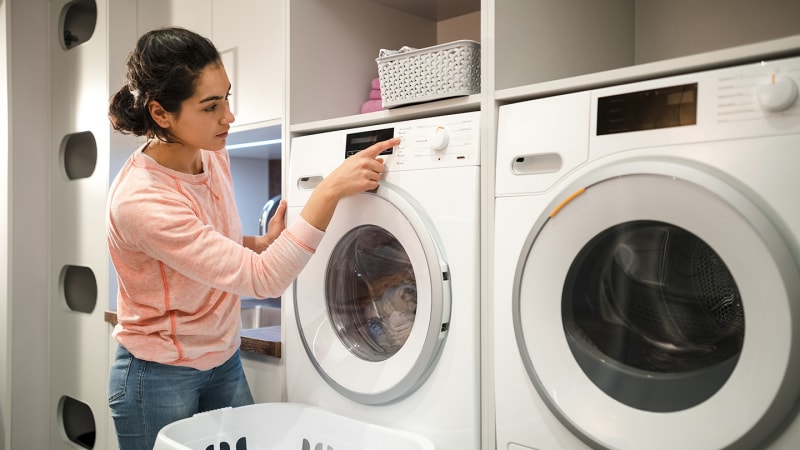How to lower your electricity bill

Key highlights:
- Heating and cooling appliances are typically the biggest energy consumers in a home, so consider these first for potential energy savings.
- Some appliances use more energy than others, so it’s important to assess the age, model and energy label for your home electronics.
- Even small adjustments to your habits with lighting and other minor electronics can help you save on your electric bill.
If you’re looking to reduce your overall budget, your electric bill could be a good place to start looking for savings. Oftentimes, we over-utilize energy without even realizing it. In addition to being budget-friendly, finding savings in your electricity use can help reduce your carbon footprint and make your lifestyle more environmentally friendly. In this article, we’ll identify some simple ways to potentially lessen your energy usage and save on your electric bill.
Identify key electric saving opportunities
While each household’s usage will vary depending on lifestyle, certain appliances tend to have more of an impact on the electric bill than others. In general, appliances you use to control the temperature of your living space (heating and cooling) are typically the biggest energy consumers. You should also consider the impact of water heaters, lighting, refrigerators, dishwashers, TVs and sound systems in your home.
While you may already have a pretty good idea of which appliances are making the biggest impact, there are a few ways to find out what runs up your electric bill the most:
- Check the energy label: Many larger household appliances are mandatorily labeled with information about their power consumption. If your item isn’t labeled, you may be able to find energy details on the manufacturer’s website.
- Use an energy meter: There are many different types of meters available for purchase, including meters that can measure the usage for individual outlets. This can help you determine which appliances are making an outsized impact on your bill.
- Schedule an energy audit: In many cases, energy providers offer professional audits. During an audit, an energy expert can help identify potential usage concerns around your house or unit and make personalized recommendations.
Lower electricity bills by optimizing heating and cooling
Because heating and cooling costs generally make up the largest portion of a household’s energy use, it’s a key area to adjust for electric savings.
- Seal windows and doors. If your home has leaky windows and doors, your heater or cooler will need to work harder to keep the temperature consistent. Sealing cracks around your doors and windows (or replacing them) can help reduce energy loss.
- Use a programmable thermostat. Programmable thermostats can help manage energy costs by automatically adjusting temperature in your home. Most models allow you to set a schedule, while others use your phone’s location to adjust the temperature automatically when you leave the house.
- Schedule regular HVAC maintenance. Professional HVAC cleaning and maintenance can help ensure that your system is running efficiently. As a rule of thumb, most systems require maintenance once or twice a year.
Adopt energy-efficient lighting habits
Small changes to your home lighting could also help you save money on your electrical bill.
- Make the most of natural light. Some people find themselves in the habit of flipping on an overhead light, even when it’s bright outside! If this is you, try to be mindful, and consider opening the shades instead.
- Turn off lights in unoccupied rooms. It may seem like a minor inconvenience to turn lights on and off as you move around your home, but your energy bill will thank you. As an extra tip, consider motion sensors or timers for your lighting.
- Use task-based lighting. Lighting that’s concentrated on a single area, such as a desk or reading lamp, can be more energy efficient than brighter overhead lighting.
- Use high-efficiency bulbs. Not all bulbs are created equal. When it’s time to replace yours, consider purchasing LED, compact fluorescent lamps (CFLs) or halogen bulbs.
Use energy-efficient appliances
If you’re trying to save on your electrical bill to trim your budget (PDF), buying new appliances might seem counterintuitive. However, older appliances may be drawing more power than you realize. Refrigerators, furnaces, washing machines, dryers and even televisions are known to become less energy efficient with age. When shopping for a new appliance, it’s important to consider both efficiency and product features.
Look for ENERGY STAR certifications
The U.S. Environmental Protection Agency (EPA) has an ENERGY STAR® program which promotes energy efficiency by providing information about different products’ energy consumption. Products with an ENERGY STAR label meet the EPA’s strict guidelines for quality and efficiency and can help contribute to your energy savings goals. Keep an eye out for the blue and white ENERGY STAR label when shopping around.
Pick appliances that suit your needs
When looking for appliances that will help you save on your electric bill, make sure that you are considering which features will help you avoid overconsumption, or the excessive use of energy. For example, if you live alone, you may find that going with a smaller dryer is more practical for your needs in addition to being more efficient. On the other hand, a larger household may benefit from a larger dryer to avoid doing extra loads of laundry. In some cases, a more suitable and efficient appliance will cost more but offer the potential for greater energy savings over time.
Reduce standby power loads
Left unchecked, standby power consumption can make a significant impact on your electrical bill. Sometimes referred to as “phantom” or “vampire” power, many electronics continue to draw a small amount of electricity even when they’re powered down. You can limit this waste by unplugging electronics you're not using or turning off power strips left plugged in.
In conclusion
Looking for small and large ways to manage your electric bill is a worthy goal that can lead to real cost savings in your household budget. Adjustments to how you use the appliances you already own, as well as future purchases, can contribute to savings on your electric bill. And as a bonus, lessening your energy use also means lessening your impact on the planet. By making conscientious choices, you may be able to save money on your electric bill without drastically altering your lifestyle.



